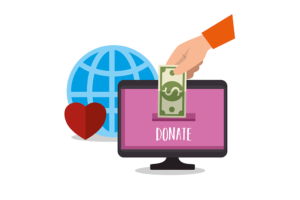The Abuses of USAID: How We Got Here
Year after year, taxpayer money is shipped overseas and called “development” or “security assistance.” But it all disappears into black holes of corruption. It’s used to subsidize dictatorships and fund leftist NGOs (Non-government organizations) that undermine American values. USAID has become a slush fund for special interests. Of course, the legislators will claim they were not giving the money to foreign governments, but the reality is that they were giving it to U.S. Crony Corporatists to do work in foreign nations. USAID is only the tip of the iceberg.
But the real question is: Should we even be ‘helping’ foreign nations?
But where in the U.S. Constitution is the federal government even authorized to take taxpayer money and send it for overseas purposes?
The short answer? It’s not.
Who Gave the Government the Power to Hand Out Your Money?
When we look at the enumerated powers granted to Congress in Article I, Section 8 of the Constitution, we see that the federal government is given authority over taxation, defense, interstate commerce, and coining money. Nowhere does it say, “Congress shall have the power to send taxpayer money for or to foreign governments or purposes.”
Some try to justify foreign aid using the “General Welfare Clause” or the “Necessary and Proper Clause”, but these arguments fall apart under scrutiny. The Founders were clear that “general welfare” applied to the American people—not to foreign nations. If “general welfare” could be stretched to mean anything Congress wanted, then there would be no constitutional limits at all.
So why are we doing it?
The Banana Republics and the Military-Industrial Complex
Foreign aid isn’t just about “helping” other nations—it’s about money and power. Historically, the U.S. has funneled aid into countries, using it to remove governments and install dictators who would serve corporate interests.
The United Fruit Company (now known as Chiquita)
One of the most notorious examples was the United Fruit Company, who collaborated with the CIA to overthrow Guatemala’s elected leader in 1954 because he refused to lease land for banana production—and thus the term Banana Republic. American corporations, backed by government contracts, have exploited cheap labor and resources while ensuring that local populations remained dependent and subservient to foreign corporate interests. Guatemala entered decades of civil war and dictatorship, leading to severe human rights abuses.
It was this same pattern of U.S. foreign aid that created the Shah in Iran in 1953, this time for Exxon, Mobil, Gulf Oil and Texaco’s benefit, setting the stage for today’s hostile regime. The overthrow of Iran’s government because they wanted to stop others from taking all their oil, was backed by U.S. funding and the CIA (what a surprise). This led to decades of instability and ultimately the rise of the Islamic Republic we now face as a potential nuclear adversary. All sadly under President Eisenhower who was told it would prevent the Soviet Union from establishing ties to both nations. If he’d stayed out of it, both nations would be free today and the USSR would still be gone.
Then there’s Afghanistan, where U.S. money in the 1980s helped fund and arm Osama bin Laden and Al-Qaeda under the guise of fighting Soviet influence. That same aid, training, and weapons were eventually turned against us, leading directly to the terror attacks of 9/11 (regardless of whomever you think planned it). The U.S. government, through reckless and unaccountable foreign aid, created the very enemies we later had to fight.
Of course, today there’s Ukraine, the latest example of how foreign aid is a disguised subsidy for the military-industrial complex. The billions sent there under the pretense of “defending democracy” have lined the pockets of crony U.S. defense contractors and kept the revolving door between government and corporate elites spinning. Meanwhile, no one can account for where much of that money actually went.
Note in the first two examples had Republican presidents at the helm all guided by “advisors” hired by Crony Corporatists. But don’t forget LBJ and Vietnam, Clinton and Haiti, Obama and Libya and Iran, and of course Biden and Ukraine.
What About National Security?
Some argue that foreign aid is a matter of national security—that if we don’t send money to certain countries, they’ll fall under the influence of our enemies. But does bribing corrupt leaders really make us safer?
Look at Afghanistan, post-war. The U.S. spent over $2 trillion there, including billions in aid money. And what happened? The Taliban took over in a matter of days, proving that all that aid did nothing to build a stable government. The same thing has happened time and again—money goes in, regimes fail, and America is left holding the bag. We already talked about how U.S. aid in the 1980s helped fund and arm Osama bin Laden and Al-Qaeda, only for them to turn against us. The same pattern keeps repeating—whether it’s the Shah in Iran, the Taliban, or corrupt Ukrainian officials today, U.S. foreign aid continues to backfire, creating long-term instability rather than solving problems.
The actual role of the U.S. government is not to protect corporate interests, but to protect our rights and defend our nation. If another Taliban-like group harbors terrorists, we shouldn’t waste money trying to rebuild their nation. We go in, kill all the bad guys, and leave. If the problem resurfaces, we go back and neutralize the threat again—until they realize that we will keep doing that and get tired of dying and stop. And we can do that without bankrupting ourselves on endless nation-building that simply does not work.
And no we don’t need to combat China’s CCP this way. I will discuss the right way to do it separately.
America First: Fix Our Own Problems First
Let’s get real: We have homeless veterans, crumbling infrastructure, and skyrocketing inflation. Why should we be funding bridges and schools in foreign nations when our own people are struggling?
If foreign aid is so essential, why can’t private charities, churches, and individuals handle it? Americans are the most generous people in the world. When disaster strikes, we step up voluntarily. But forcing taxpayers to fund foreign aid? That’s government-enforced charity, which isn’t charity at all—and worse, it simply does not work.
If You Want to Give out Foreign Aid, Pass an Amendment
Here’s a simple challenge: If politicians believe foreign aid is truly necessary, let them pass a constitutional amendment to authorize it. That’s how our system is supposed to work. If something isn’t in the Constitution, the federal government should not be doing it—period.
Until then, every dollar spent on foreign aid is illegitimate, unconstitutional, and a betrayal of the American taxpayer.
Of course if it does come up as an Amendment, I’ll be fighting against it. You should too.
It’s time to demand accountability. Whether it’s for training in Gaza to killing an elected president that we dislike it has to stop. No more wasted billions. No more funding corrupt regimes. And no more unconstitutional spending. It’s time for Congress to pass a law banning all aid to other nations—we’ve only made our world more unsafe by it.
Let’s put America first, as the Constitution intended—and we may, in fact, get a safer world.
Some additional discussion
- Objections to the Argument & Honest Rebuttals
Objection 1: Foreign Aid Advances U.S. National Security Interests
Argument: Foreign aid helps keep certain governments stable, preventing them from falling into the hands of hostile forces. It also allows the U.S. to maintain influence over strategic regions and prevent adversaries like China and Russia from expanding their reach.
Rebuttal:
- While foreign aid is often justified as a national security tool, history shows it frequently backfires (e.g., Iran, Afghanistan, Al-Qaeda).
- Aid often ends up funding corruption, undermining stability instead of strengthening it.
- Influence should come from strength, trade, and diplomacy, not by paying off foreign governments that don’t respect us.
- If a country is so fragile that it requires endless foreign aid to function, then perhaps we are propping up an unsustainable regime that will collapse anyway.
Objection 2: U.S. Aid Prevents China & Russia from Expanding Their Influence
Argument: If the U.S. stops sending foreign aid, China and Russia will step in to fill the void, strengthening their geopolitical position and making America weaker.
Rebuttal:
- The U.S. has spent trillions in foreign aid, yet China is still gaining influence because it offers long-term infrastructure projects (Belt & Road Initiative) instead of just handing out money.
- Instead of aid, the U.S. should counter China with trade agreements, strategic alliances, and direct military strength where necessary.
- If a country is willing to align with China just because they’re offering money, then they were never truly allies to begin with.
- The reality is that China’s investments are debt traps, not real economic assistance. If we stopped wasting money on ineffective aid, we could invest in economic and military deterrents that actually work.
Objection 3: Foreign Aid Helps Prevent Mass Migrations & Refugee Crises
Argument: A stable economy in poor countries means fewer people attempting to migrate illegally to the U.S. By cutting off aid, we could see more mass migrations and humanitarian crises.
Rebuttal:
- If foreign aid actually prevented instability and migration, why are we seeing more waves of illegal immigration today?
- Most foreign aid never reaches the people—it’s absorbed by corrupt bureaucracies.
- Real migration deterrents include strict border policies, economic reforms, and letting local populations be responsible for their own nations instead of making them dependent on U.S. aid.
- Many people migrate to the U.S. because they see it as an opportunity, not because of instability alone—no amount of foreign aid will stop that desire.
Objection 4: Humanitarian Responsibility
Argument: As a wealthy nation, the U.S. has a moral duty to help the less fortunate around the world.
Rebuttal:
- Individuals, charities, and churches already engage in massive global humanitarian work—this should not be forced through taxation.
- Government-mandated charity is not real charity—it’s theft from taxpayers.
- If humanitarianism were the real motive, we wouldn’t send aid to corrupt regimes and military-industrial cronies—we would send it directly to suffering people.
- The U.S. government’s first responsibility is to its own people—we have homeless veterans, a national debt crisis, and rising crime. Why are we sending money overseas when we can’t take care of our own?
Objection 5: U.S. Military Occupations Worked in Japan & Germany
Argument: The U.S. successfully rebuilt Japan and Germany after WWII using foreign aid and military occupation, leading them to become strong allies and economic powerhouses.
Rebuttal:
- Japan and Germany were industrialized nations with centralized governments—Iraq and Afghanistan were tribal societies with deep-seated ethnic and sectarian divides.
- The U.S. didn’t just give Japan and Germany money—we rewrote their governments, stationed military forces long-term, and ensured democratic transitions.
- The world today is different—nations like Afghanistan and Iraq were never going to function like post-war Germany or Japan because they lacked the institutions and historical foundations.
- The biggest difference? Japan and Germany surrendered completely—Iraq and Afghanistan never had a decisive end, making occupation and rebuilding doomed to fail from the start.
- What About the Soviet Union, China, and Future Threats?
What About the Soviet Union?
During the Cold War, the U.S. used foreign aid as a tool to prevent nations from falling under Soviet influence—which some argue was effective in certain cases.
Rebuttal:
- The Marshall Plan rebuilt Western Europe after WWII, but that was a unique case—it focused on nations that already had the capacity to rebuild (France, Italy, Germany).
- Many Cold War aid programs backfired—funding dictators and corrupt regimes that later turned against us.
- The real deterrent to the Soviet Union was military strength, economic superiority, and direct containment, not throwing money at foreign governments.
What About China Today?
China is actively expanding its influence through loans, infrastructure projects, and economic agreements. If we stop giving foreign aid, do we risk letting China dominate strategic regions?
Rebuttal:
- China’s Belt and Road Initiative (BRI) is a debt trap, not real economic aid—many countries are already rejecting Chinese deals because they see how predatory they are.
- The best counter to China isn’t more aid—it’s energy independence, military strength, better trade deals, and strategic alliances.
- China is playing the long game—instead of handing out money, they build infrastructure and demand economic concessions in return. The U.S. should compete smarter, not waste money on corrupt regimes.
What About Future Threats?
Some argue that if we cut foreign aid completely, a new global superpower—perhaps China, Russia, or another rising nation—will use aid to gain influence, leaving the U.S. isolated.
Rebuttal:
- The world’s most powerful nations don’t buy influence through aid—they gain it through economic power, military dominance, and strong alliances.
- Foreign aid has been used as a crutch instead of real diplomacy—if we stop throwing money at problems, we’ll be forced to develop better strategies for maintaining influence.
- If a nation is truly aligned with U.S. interests, they shouldn’t need constant financial bribes—they should be allies because of shared values and interests.
- Instead of foreign aid, the U.S. should invest in strengthening its own economy and military—a strong America is the best deterrent to foreign threats.
Conclusion: Is the Thesis Still Strong?
After testing these objections, the core thesis remains solid:
- Foreign aid is ineffective, wasteful, and often counterproductive.
- Strong diplomacy, trade agreements, and military readiness are more effective tools for maintaining U.S. influence.
- If foreign aid is truly necessary, it should be debated transparently and justified to the American people—not handed out as a slush fund for corrupt elites.











